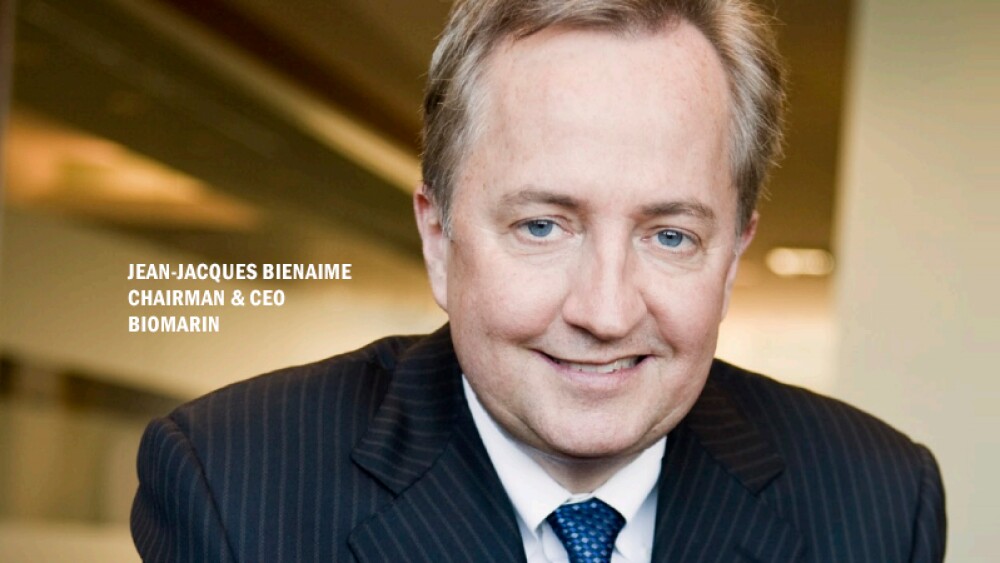July 29, 2016
By Mark Terry, BioSpace.com Breaking News Staff
An interesting, and occasionally disconcerting, business model has developed in a sector of the pharmaceutical industry. For certain super-rare diseases, ones where only a few thousand people are affected, there seemed to be little or no incentive for drug companies to spend millions of dollars on developing a treatment. But now there are companies focusing on the rare-disease market and developing drugs that have treatments that often range in price from hundreds of thousands of dollars to a million dollars. And for the most part, governments or payers are willing to pay the sky-high prices.
Forbes profiles one of the more successful rare-disease companies, BioMarin Pharmaceutical , headquartered in San Rafael, California.
Most recently BioMarin became known for its failure—its Kyndrisa (drisapersen) for Duchenne muscular dystrophy (DMD), a rare muscle wasting disease that affects mostly boys, about 1 in every 3,500 to 5,000 male children.
But the company has a drug, Aldurazyme (laronidase) for a very rare lethal disease, mucopolysaccharidosis I (MPS I), which results in toxic, sticky starches accumulating in the body. It has four other products on the market to treat other extremely rare diseases. As Forbes points out, the company brings in $890 million a year with four drugs that treat only 8,000 patients worldwide. And the price for at least one of those drugs could hit $1 million per patient per year.
Forbes writes, “BioMarin … is expected to turn its first profit from continuing operations next year and has a market capitalization of almost $15 billion, based on the medicines it sells and on hopes for more, including a gene therapy that might cure hemophilia. Shares are up 460 percent over the past ten years.”
Those medications include Kuvan, to treat phenylketonuria (PKU), which most people who have ever had a drink of a diet soda containing NutraSweet, have probably heard of. Patients with PKU can’t process phenylalanine, which is found in meat and Nutrasweet, and causes damage to the brain. “About 7,500 patients are being actively treated for PKU in clinics,” reports Forbes, “treating a typical patient costs $100,000 a year. Sales in 2015: $240 million.”
Given the overall controversies regarding drug pricing, why do payers in the U.S. pay for these high-priced drugs?
Partly because in the case of such rare diseases, these drugs are often the only treatment. “To be very frank, we are a price acceptor when it comes to ultra-orphans,” Steven Miller, the chief medical officer of Express Scripts, a U.S. pharmacy benefits manager, told Forbes. “There’s no competition. It’s pharma that’s putting these prices out there. There’s nothing we can do.”
Although it’s possible that this will change, now that so much negative publicity has been associated with drug pricing during this election cycle and the crash-and-burn media coverage of former Turing Pharmaceuticals’ chief executive, Martin Shkreli.
“There probably is a growing comfort with payers starting to [try to control] costs for rare disease,” Russell Teagarden, a former senior vice president of the National Organization for Rare Disorders, told Forbes.
But BioMarin continues to swing for the fences, despite the DMD disaster and a recent problem with its hemophilia A clinical trial. In June, the company indicated it had temporarily suspended recruitment for its trial of BMN 270, a gene therapy treatment, although that appears to be a minor glitch taken as a safety precaution.
And BioMarin has other products in its pipeline, including a drug for children with achondroplasia, which leads to dwarfism. It also has drugs under investigation for Pompe disease, CLN2 disease, and Sanfilippo Syndrome. But the hemophilia A could be a huge drug for the company, if it is approved, and has shown very positive results in early trials.
But bigger pharma companies are taking notice of the huge profits available in the rare disease market. There are rumors that Paris-based Sanofi , if it should turn away from its hostile takeover bid of San Francisco-based Medivation , it might turn its gaze to BioMarin.





